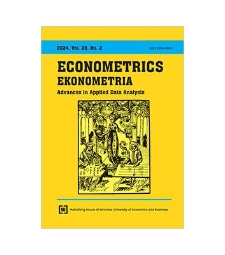Dolnośląska Biblioteka Cyfrowa udostępnia 109 608 obiektów cyfrowych
Obiekt
Tytuł: Default Prediction Using the Cox Regression Model and Macroeconomic Conditions – A Lifetime Perspective
Tytuł odmienny:
Autor:
Ptak-Chmielewska, Aneta ; Gonzalez, Juan Pablo Espinosa
Opis:
Econometrics = Ekonometria, 2024, Vol. 28, No. 2, s. 50-61
Abstrakt:
Wydawca:
Publishing House of Wroclaw University of Economics and Business
Miejsce wydania:
Data wydania:
Typ zasobu:
Identyfikator zasobu:
doi:10.15611/eada.2024.2.04 ; oai:dbc.wroc.pl:127168
Język:
Powiązania:
Econometrics = Ekonometria, 2024, Vol. 28, No. 2
Prawa:
Pewne prawa zastrzeżone na rzecz Autorów i Wydawcy
Prawa dostępu:
Dla wszystkich zgodnie z licencją
Licencja:
CC BY-SA 4.0
Lokalizacja oryginału:
Tytuł publikacji grupowej:
Kolekcje, do których przypisany jest obiekt:
- Dolnośląska Biblioteka Cyfrowa > Uczestnicy Konsorcjum > 04. Uniwersytet Ekonomiczny we Wrocławiu > Czasopisma wydawane przez Wydawnictwo UEW
- Dolnośląska Biblioteka Cyfrowa > Uczestnicy Konsorcjum > 04. Uniwersytet Ekonomiczny we Wrocławiu > Czasopisma wydawane przez Wydawnictwo UEW > Econometrics = Ekonometria. Advances in Applied Data Analysis
- Dolnośląska Biblioteka Cyfrowa > Zasoby > 2. Czasopisma > Czasopisma współczesne
Data ostatniej modyfikacji:
25 lip 2024
Data dodania obiektu:
24 lip 2024
Liczba wyświetleń treści obiektu:
190
Wszystkie dostępne wersje tego obiektu:
https://dlibra.kdm.wcss.pl/publication/165814
Wyświetl opis w formacie RDF:
Wyświetl opis w formacie OAI-PMH:
| Nazwa wydania | Data |
|---|---|
| Default Prediction Using the Cox Regression Model and Macroeconomic Conditions – A Lifetime Perspective | 25 lip 2024 |
Obiekty Podobne
Ptak-Chmielewska, Aneta
Ptak-Chmielewska, Aneta
Ludwiczak, Bogdan
Ptak-Chmielewska, Aneta Matuszyk, Anna
Ptak-Chmielewska, Aneta Kuleta, Piotr
Mikulec, Artur Misztal, Małgorzata
Markowicz, Iwona
























